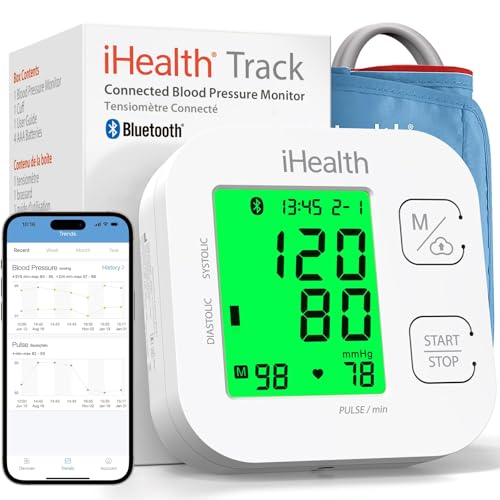Maintaining cardiovascular health as you age is key to staying active and independent. You should regularly monitor your blood pressure and cholesterol because both can increase silently, risking heart disease. Adopting a healthy diet low in saturated fats, exercising regularly, managing stress, and following your doctor’s advice help keep your arteries clear. By taking these steps, you directly support your heart’s well-being—continue exploring strategies to protect your cardiovascular health for years to come.
Key Takeaways
- Regular blood pressure and cholesterol monitoring are essential for early detection and management of cardiovascular risks in seniors.
- Maintaining a healthy diet rich in fruits, vegetables, whole grains, and heart-healthy fats supports cardiovascular health.
- Consistent physical activity, such as 150 minutes of moderate exercise weekly, improves heart function and cholesterol levels.
- Managing stress, avoiding tobacco, and adhering to prescribed medications help prevent cardiovascular complications.
- A holistic approach combining lifestyle changes and medical care promotes long-term heart health in aging individuals.

As you age, maintaining cardiovascular health becomes increasingly essential, since the risk of heart disease and related conditions rises considerably in the elderly. Your blood pressure management and cholesterol control play critical roles in preventing these issues. High blood pressure, or hypertension, often develops silently and can damage your arteries, heart, and kidneys if left unchecked. Regular monitoring helps you catch any increases early, and sticking to prescribed medications, reducing salt intake, and staying active can help keep your blood pressure within a healthy range. Managing stress and avoiding tobacco also contribute markedly to maintaining stable blood pressure levels. According to divorce statistics, stress management techniques can have a positive impact on cardiovascular health, especially in older adults.
Maintaining blood pressure and cholesterol is vital for heart health as you age.
Cholesterol control is equally indispensable because elevated cholesterol levels can lead to plaque buildup in your arteries, narrowing blood flow and increasing the risk of heart attacks and strokes. You can manage your cholesterol by adopting a diet low in saturated fats and trans fats, while increasing your intake of fiber-rich foods like fruits, vegetables, and whole grains. Incorporating heart-healthy fats, such as those found in fish, nuts, and olive oil, can also help improve your cholesterol profile. Regular exercise, at least 150 minutes of moderate activity per week, boosts your HDL (good cholesterol) and lowers your LDL (bad cholesterol). If lifestyle changes aren’t enough, your doctor may recommend medications like statins to help keep your cholesterol levels in check.
In addition to medication and diet, routine check-ups are indispensable. They allow your healthcare provider to assess your blood pressure and cholesterol levels and adjust your treatment plan as needed. It’s essential to be proactive about your heart health, especially because aging naturally affects blood vessel elasticity and function. Staying informed about your numbers and understanding their implications empowers you to take control of your health.
Furthermore, adopting a holistic approach—combining proper nutrition, physical activity, stress management, and medication adherence—can greatly lower your risk of cardiovascular complications. Even small changes, such as taking the stairs instead of the elevator or choosing water over sugary drinks, add up over time. Remember, managing your blood pressure and cholesterol is a continuous process, not a one-time fix. Consistency is key to reducing your risk and maintaining a good quality of life as you age. By staying vigilant and making informed choices, you actively protect your heart and arteries, ensuring better health and vitality in your later years.

iHealth Track Smart Upper Arm Blood Pressure Monitor with Wide Range Cuff That fits Standard to Large Adult Arms, Bluetooth Compatible for iOS & Android Devices
Clinically Accurate: Easy Operation by two buttons, Advanced Accuracy, No Calibration required.
As an affiliate, we earn on qualifying purchases.
As an affiliate, we earn on qualifying purchases.
Frequently Asked Questions
How Does Aging Specifically Affect Heart Muscle Function?
As you age, your heart muscle’s elasticity decreases, making it stiffer and less efficient at pumping blood. You also experience cardiac muscle atrophy, which means your heart muscle shrinks and weakens over time. These changes reduce your heart’s ability to respond to stress and can lead to decreased cardiac output. Recognizing these effects helps you understand the importance of maintaining cardiovascular health through regular exercise and a healthy lifestyle.
Are There Genetic Factors Influencing Elderly Cardiovascular Health?
Genetic factors definitely influence your cardiovascular health as you age. While lifestyle matters, genetic predispositions and family history can increase your risk of heart issues. Don’t assume you’re powerless—knowing your family history helps you take proactive steps. By understanding these genetic influences, you can work with your healthcare provider to develop targeted strategies, reducing your risk and promoting better heart health in later years.
What Are the Latest Advancements in Elderly Heart Disease Treatment?
You should explore recent advancements like stem cell therapy and personalized medicine, which are transforming elderly heart disease treatment. Stem cell therapy promotes tissue repair and regeneration, potentially restoring heart function. Personalized medicine tailors treatments to your genetic profile, improving effectiveness and reducing side effects. These innovations aim to provide more targeted, efficient care, helping you manage heart disease better and improve your quality of life.
How Do Social Factors Impact Cardiovascular Health in Seniors?
You might think social factors don’t matter, but they play a huge role. Social support and community engagement actually boost your heart health by reducing stress and encouraging healthier habits. Ironically, loneliness can be as harmful as poor diet or lack of exercise. Staying connected with loved ones and participating in community activities can improve your cardiovascular health and overall well-being, proving that a good social life truly benefits your heart.
Can Alternative Therapies Improve Heart Health in the Elderly?
Yes, alternative therapies like herbal supplements and acupuncture therapy can improve heart health in the elderly. Herbal supplements such as garlic or omega-3s may help lower blood pressure and cholesterol, while acupuncture therapy can reduce stress and improve circulation. You should talk to your healthcare provider before trying these options to guarantee they’re safe and appropriate for your specific health needs. Incorporating these therapies might complement your overall heart health strategy.

QuCare Complete Total Only Cholesterol Test, 2 Tests, Quick, Simple & Easy-to-Use, Clear Easy to Read Results, Detects Cholesterol Levels in Your Blood
Total Cholesterol: This is the cumulative measure of all types of cholesterol in your blood. This is the…
As an affiliate, we earn on qualifying purchases.
As an affiliate, we earn on qualifying purchases.
Conclusion
Just as a wise captain navigates treacherous seas, you can steer your cardiovascular health with mindful choices. Embrace a balanced diet, stay active, and monitor your well-being regularly. Remember, the journey to a healthier heart is ongoing, much like Odysseus’ voyage—full of challenges but worth every effort. By taking charge today, you guarantee calmer waters ahead, allowing you to enjoy life’s precious moments with vitality and confidence.

The Mediterranean Heart-Healthy Diet Cookbook for Seniors: Delicious 20-Minute Recipes with Low-Sodium & Common Ingredients to Help Your Cardiovascular Health, Control Weight, and Boost Longevity
As an affiliate, we earn on qualifying purchases.
As an affiliate, we earn on qualifying purchases.

MDODM Pedal Exerciser Bike for Seniors, Hand Arm Leg and Knee Physical Therapy Exercise Equipment, Elderly Recovery Home Exercise Bike for Total Body, Upper and Lower Limb Trainer
Full Body Exercise & Rehab: The pedal exercise bike for seniors provides a full body workout: simultaneous movement…
As an affiliate, we earn on qualifying purchases.
As an affiliate, we earn on qualifying purchases.









